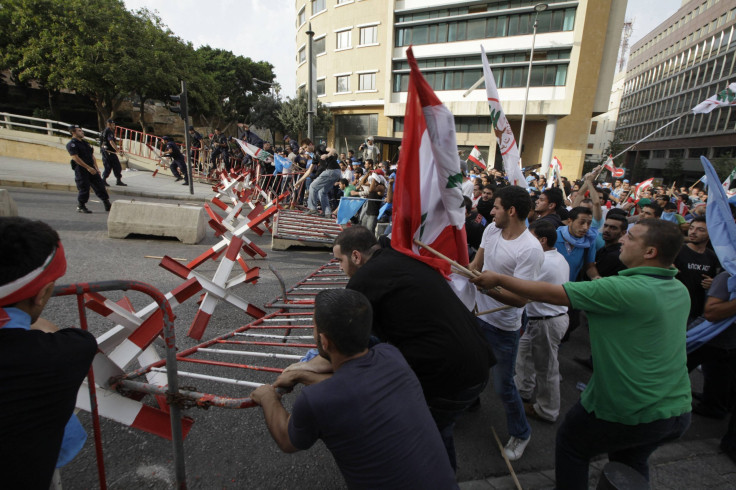Bad Memories, Bold Military Urge Restraint Amid Lebanese Violence

The car bomb that exploded in Beirut last week was Lebanon’s worst attack in years, but most Lebanese have lived through far more harrowing times.
In this small Middle Eastern country on the eastern shores of the Mediterranean Sea, the median age is about 30. That means most citizens have clear memories of the 1975-1990 civil war, a conflict that killed about 120,000 and permanently maimed hundreds of thousands more.
The dust officially settled 22 years ago, barely covering old fault lines that remain as jagged and deep as ever. Now, rumbles of conflict in neighboring Syria are exposing those divisions once again.
In the middle of it all is the Lebanese national military, desperate to establish order lest the country be torn apart by clashes spilling over from Syria, where 19-month uprising against the regime of President Bashar al-Assad has cost about 30,000 lives.
The Syrian conflict pits majority-Sunni rebels against a regime that is dominated by Alawite, an unorthodox offshoot of Shi'a Islam. About 300,000 people have fled the carnage so far, and up to 100,000 have sought refuge in Lebanon, which is itself a hotbed for Sunni-Shi'a tension and has seen more frequent clashes since the Syrian uprising began.
The car bomb is the worst such incident yet. Eight people were killed and at least 80 wounded in the affluent, majority-Christian neighborhood of Ashrafiyeh of East Beirut on Friday.
One of the victims -- and likely the principal target of the attack -- was Brig. Gen. Wissam al-Hassan, the head of Lebanon’s Information Branch of the Internal Security Forces. He was a vocal critic of the Assad regime, and many of Lebanon’s Christian and Sunni citizens blame his death on operatives from Syria and Hezbollah, the militant Shi'a organization that largely controls the Lebanese government and is supported by Damascus.
Hassan was a political ally of Saad Hariri, a former prime minster and leading member of the March 14 alliance, an anti-Syria opposition bloc. Saad Hariri is the son of Rafik Hariri, an anti-Syrian former prime minister of Lebanon who became a national symbol -- some would say martyr -- when he was assassinated in 2005.
At that time, the Syrian troops whose offensive effectively ended Lebanon’s civil war in 1990 were still occupying the country. It was Rafik Hariri’s death that sparked a Lebanese revolt that finally ousted Syrian troops from Lebanon.
On Friday, Saad Hariri was quick to draw a parallel between the deaths of his father and Hassan.
“We have always thought Bashar al-Assad has killed Rafik Hariri and today he has also killed Wissam al-Hassan,” he said, according to CNN.
It is this kind of rhetoric that worries the Lebanese Armed Forces, a fairly neutral entity that has long acted as a buffer between various rival factions in Lebanon.
On Monday, the military released a strong statement to discourage political leaders from inciting conflict.
“We call on all political leaders to be cautious when expressing their stances and opinions ... because the fate of the country is on the line,” said the statement, according to Reuters.
“The last few hours have proven without a doubt that the country is going through a decisive and critical time and the level of tension in some regions is rising to unprecedented levels.”
Since Friday, clashes have picked up considerably in Beirut and elsewhere. They mainly pit Shi'as against Sunnis, with both sides demarcating territories, setting up checkpoints and volleying gunfire. At least seven people have lost their lives in these recent clashes, mostly in Beirut and Tripoli, Lebanon’s second city.
The military has launched a national offensive to restore order, dismantling sectarian checkpoints and establishing their own.
Prime Minister Najib Mikati, a moderate Sunni who is nonetheless backed by Hezbollah, sought to allay tensions shortly after the car bomb by promising to step down if need be. “If they want a new government, I am ready,” he said, according to Lebanon’s Daily Star.
Sunni activists have indeed called for the prime minister to relinquish his post, but Western leaders have argued against such a move. An emergency meeting of representatives of the five permanent members of the United Nations Security Council was called in Beirut on Monday. Following talks, UN Special Coordinator for Lebanon Derek Plumby urged caution and restraint.
“Council members underlined their determination… to support the Government of Lebanon to put an end once and for all to impunity in Lebanon,” he said in a statement.
“We take this opportunity to repeat that message and to call on all parties in Lebanon to preserve national unity in the face of such attempts.”
Western diplomats and a determined military may yet quell the outburst that has threatened Lebanon’s stability in recent days. Sectarian rivalries are strong, but memories of the devastating civil war -- a cautionary tale still fresh in the minds of many -- may be even stronger.
© Copyright IBTimes 2024. All rights reserved.






















